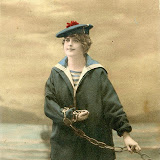‘"If," they cried, " you are weary of these ties of kindred, these marriage-bonds, then turn your anger upon us; it is we who are the cause of the war, it is we who have wounded and slain our husbands and fathers. Better for us to perish rather than live without one or the other of you, as widows or as orphans."’
Livy, The Rape of the Sabines, from Ab Urbe Condita
Three classical accounts of women and war to keep in mind when considering propaganda images of women are Livy’s account of the rape of the Sabine women (rape in its original use meaning abduction, not sexual assault), Aristophanes’ play Lysistrata and The Trojan Women by Euripides. All three informed the imagery even if the publishers and the customers weren’t aware of them. In Livy and Lysistrata the women intervene to put an end to war, humiliating the men into realizing that they (the women) are ultimately responsible to the survival of the society. In The Trojan Women they pay the consequences for the ignorance of their menfolk. In all three women are the civilizing force. In the postcards displayed here the message is just as blunt though slightly skewed; the women are telling the men they have a duty to protect civilization from an enemy that wants to destroy it. All these cards are French though Germany used near identical imagery for the same purpose.
Propaganda is never intended to be subtle and the imagery here isn’t. During World War I women in the British Empire were encouraged to send a white feather to men they suspected of shirking. These postcards had a similar intent. Not that they were accusatory or that they were always sent to men but they were an explicit and banal reminder of what the war was being fought for, hence the classical militarism and the invocations of Joan of Arc and Boadicea. Several of the cards show women wearing the traditional black bow, the schlupfkàpp, of Alsace-Lorraine. Germany had annexed the region during the Franco-Prussian War in 1871 and since then had become a symbol to France of what had been stolen from its national identity. The woman trampling the German border post and the teacher instructing her pupils on their true national identity are unambiguous in their meaning. Even an illiterate peasant would have got the message.
The most macabre image is the photomontage of the babies sprouting in the cabbage patch. “Graines de Poilus” – “Seeds of our Soldiers” was a common metaphor that various postcard publishers used and you could say it is somewhat alien to our way of thinking, for what are these children if they are not ready for the harvesting? The depiction of children in these postcards veers towards the grotesque. In none is there any sense that children might be innocent victims of war. A baby in a crib can’t wait to join his (presumably deceased) father’s regiment and a girl holds a flag under the slogan, “bruised but victorious”. In “Duty before all” the boy in the sentry box looks askance as the girl tempts him with flowers. It’s cute, if you believe a child’s destiny is to be cannon fodder.
Most of the postcards shown here use real photographs as the foundation for montage. Others are photogravure or collotypes. We know a little about the companies however they rarely acknowledged the photographer or the source, which could be a studio that sold the image on to them. A couple of the identified creators made names for themselves. Maurice Boulanger was already well known in France for his saccharine postcards of kittens. Alfred Noyer meanwhile stuck with photographing women. During the 1920s he was one of the most prolific producers of erotic postcards in the country.
VIEW THE GALLERY HERE
 |
| PATHS OF GLORY |




I always enjoy your posts. Amazing images I would have otherwise never seen and text that enlightens.
ReplyDeleteI have given you mention today at my site. One of those awards that gets passed around. You need not continue it, but it gave me the chance to tell others they should be visiting your site.